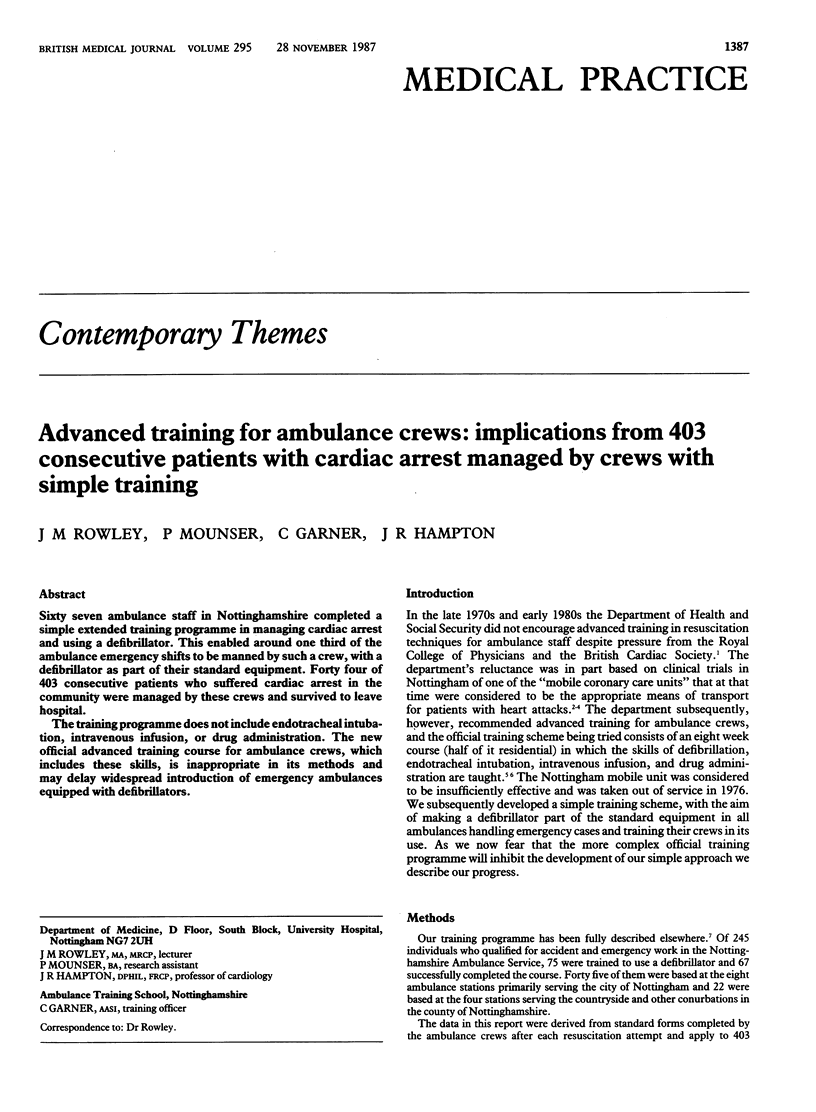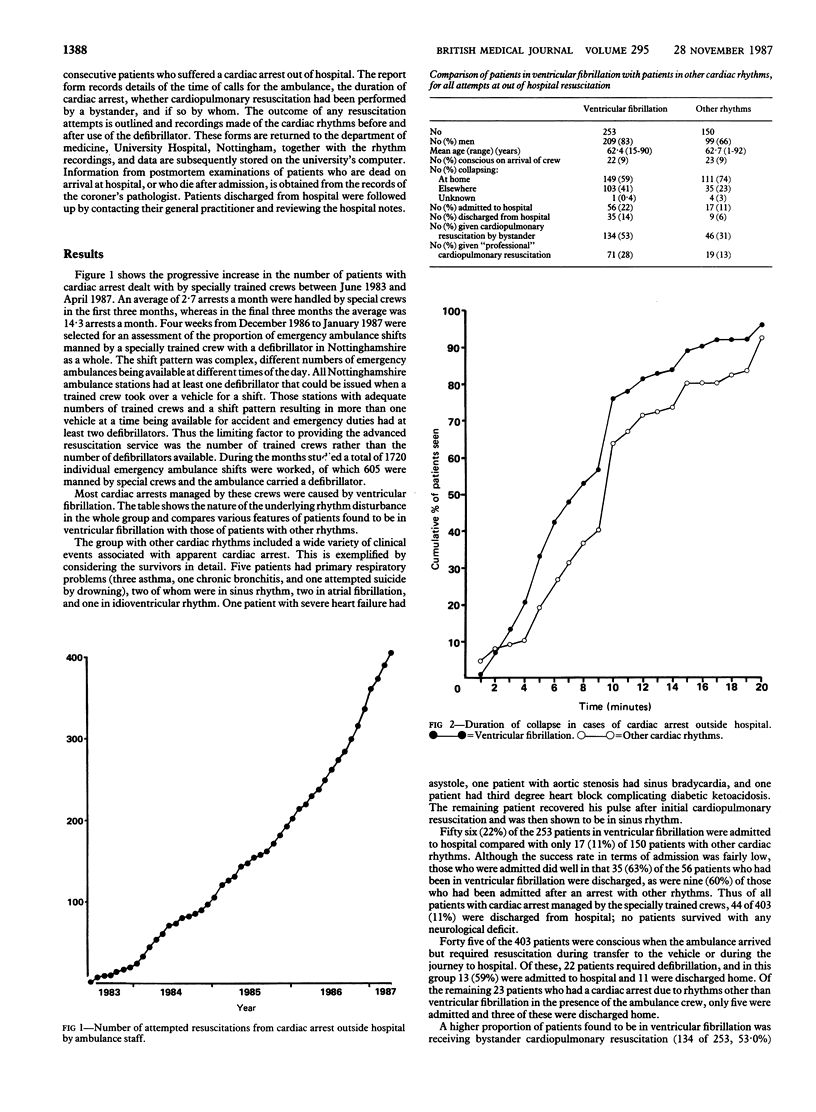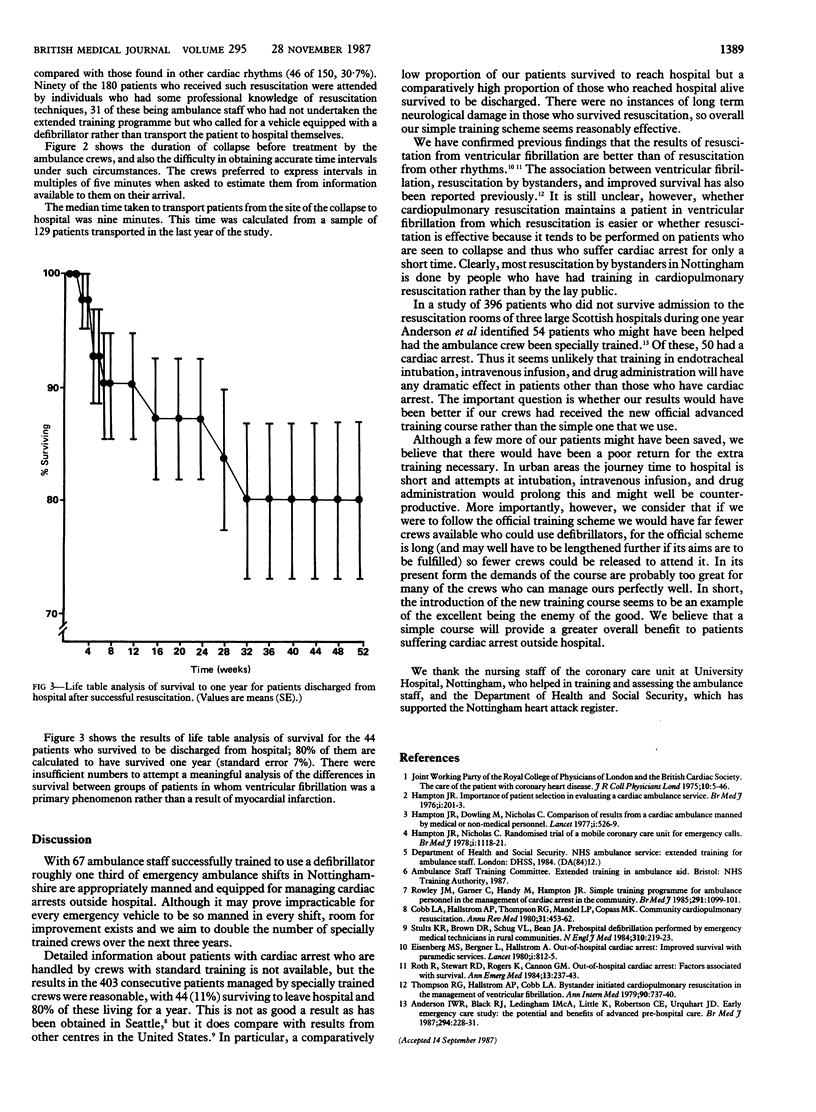Abstract
Sixty seven ambulance staff in Nottinghamshire completed a simple extended training programme in managing cardiac arrest and using a defibrillator. This enabled around one third of the ambulance emergency shifts to be manned by such a crew, with a defibrillator as part of their standard equipment. Forty four of 403 consecutive patients who suffered cardiac arrest in the community were managed by these crews and survived to leave hospital. The training programme does not include endotracheal intubation, intravenous infusion, or drug administration. The new official advanced training course for ambulance crews, which includes these skills, is inappropriate in its methods and may delay widespread introduction of emergency ambulances equipped with defibrillators.
Full text
PDF


Selected References
These references are in PubMed. This may not be the complete list of references from this article.
- Anderson I. W., Black R. J., Ledingham I. M., Little K., Robertson C. E., Urquhart J. D. Early emergency care study: the potential and benefits of advanced prehospital care. Br Med J (Clin Res Ed) 1987 Jan 24;294(6566):228–231. doi: 10.1136/bmj.294.6566.228. [DOI] [PMC free article] [PubMed] [Google Scholar]
- Cobb L. A., Hallstrom A. P., Thompson R. G., Mandel L. P., Copass M. K. Community cardiopulmonary resuscitation. Annu Rev Med. 1980;31:453–462. doi: 10.1146/annurev.me.31.020180.002321. [DOI] [PubMed] [Google Scholar]
- Eisenberg M. S., Bergner L., Hallstrom A. Out-of-hospital cardiac arrest: improved survival with paramedic services. Lancet. 1980 Apr 12;1(8172):812–815. doi: 10.1016/s0140-6736(80)91305-7. [DOI] [PubMed] [Google Scholar]
- Hampton J. R., Dowling M., Nicholas C. Comparison of results from a cardiac ambulance manned by medical or non-medical personnel. Lancet. 1977 Mar 5;1(8010):526–529. doi: 10.1016/s0140-6736(77)91384-8. [DOI] [PubMed] [Google Scholar]
- Hampton J. R. Importance of patient selection in evaluating a cardiac ambulance service. Br Med J. 1976 Jan 24;1(6003):201–203. doi: 10.1136/bmj.1.6003.201. [DOI] [PMC free article] [PubMed] [Google Scholar]
- Hampton J. R., Nicholas C. Randomised trial of a mobile coronary care unit for emergency calls. Br Med J. 1978 Apr 29;1(6120):1118–1121. doi: 10.1136/bmj.1.6120.1118. [DOI] [PMC free article] [PubMed] [Google Scholar]
- Roth R., Stewart R. D., Rogers K., Cannon G. M. Out-of-hospital cardiac arrest: factors associated with survival. Ann Emerg Med. 1984 Apr;13(4):237–243. doi: 10.1016/s0196-0644(84)80470-9. [DOI] [PubMed] [Google Scholar]
- Rowley J. M., Garner C., Handy M., Hampton J. R. Simple training programme for ambulance personnel in the management of cardiac arrest in the community. Br Med J (Clin Res Ed) 1985 Oct 19;291(6502):1099–1101. doi: 10.1136/bmj.291.6502.1099. [DOI] [PMC free article] [PubMed] [Google Scholar]
- Stults K. R., Brown D. D., Schug V. L., Bean J. A. Prehospital defibrillation performed by emergency medical technicians in rural communities. N Engl J Med. 1984 Jan 26;310(4):219–223. doi: 10.1056/NEJM198401263100403. [DOI] [PubMed] [Google Scholar]
- Thompson R. G., Hallstrom A. P., Cobb L. A. Bystander-initiated cardiopulmonary resuscitation in the management of ventricular fibrillation. Ann Intern Med. 1979 May;90(5):737–740. doi: 10.7326/0003-4819-90-5-737. [DOI] [PubMed] [Google Scholar]


